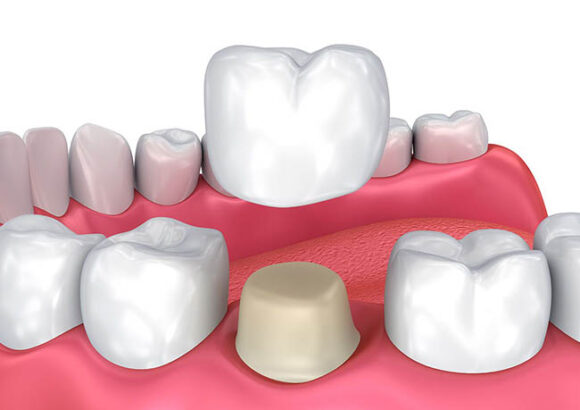Crowns

A crown is basically a cap for a damaged tooth. It can be made from a variety of materials, including metal or porcelain.
You might have a crown over a molar that rarely shows, except when you yawn widely, or you might have crowns on your front teeth that were specifically designed to match your other teeth. A natural appearance that doesn’t detract from your smile may also be a priority for you.
Several factors are important to consider when choosing a crown are cost, strength and durability
FAQ
- Porcelain
- Ceramic
- Zirconia
- Metal
- Composite resin
A combination of materials, for example, you could have a porcelain crown that’s fused to metal, as opposed to an all-porcelain crown.
When selecting the material for your crown, your dentist will consider factors such as: your tooth’s location, how much of the tooth will show when you smile, position of your gum tissue, function of the tooth that needs the crown, how much natural tooth is remaining, color of the surrounding teeth
Temporary crown
A temporary crown is exactly what it sounds like. It’s a crown that’ll only remain in your mouth for a short period of time. Your dentist will place it over your tooth with an adhesive that’s easily removed, so it won’t be as strong as a permanent crown. This is done while you’re waiting for a permanent crown to be made. The permanent crown will be placed on your tooth at a second appointment.
One-day crown
You can get a crown in a single appointment. Some dental offices offer same-day crown installation using one of several methods involving computer aided design/computer -aided manufacturing. Your new crown is designed and milled from a block of ceramic right there in the office.
If you have a large cavity that’s too big for a filling, it may be time for a crown. You may also need a crown if your tooth is: severely worn down, cracked, weakened Crowns are also recommended following a root canal on a tooth, because the tooth is more fragile and needs protection.
Crown care. Practice careful brushing. If you’re not already brushing your teeth twice a day, it’s time to start. Consider using a toothpaste for sensitive teeth if your crown or the teeth around it are sensitive to heat or cold. Flossing daily can help keep all your teeth in tip-top shape.
- Avoid hard foods. Chewing ice or hard foods might cause your crown to crack, especially if you have a porcelain crown.
- If you grind or clench your teeth at night, your dentist may recommend a night guard to protect your crown and surrounding teeth.
The lifespan of a crown can vary between 5 and 15 years. Some crowns are sturdier than others, so they may last longer. As a rule, gold crowns and porcelain-fused-to-metal crowns tend to last the longest. All-ceramic and all-porcelain crowns may look more natural, but they’re usually not as strong as the metal or porcelain-fused-to metal versions. All-resin crowns tend to wear down faster, too.

